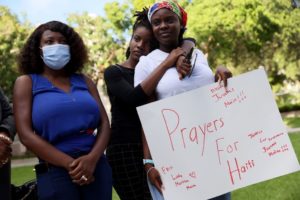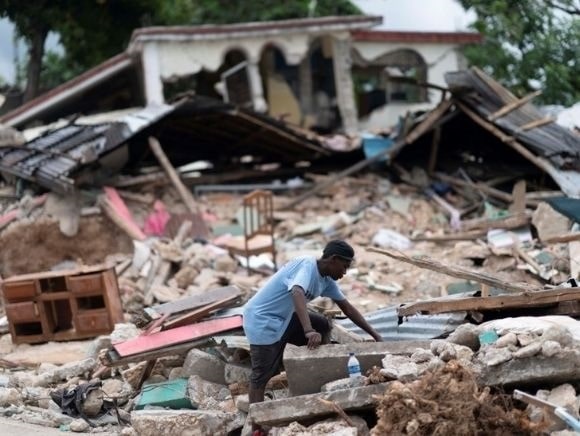The Haitian people have faced utter chaos for the last two months. An assassinated president and an earthquake have already caused an abundance of problems; then a tropical storm made matters worse. Humanitarian aid is desperately needed, but political instability, crime, and the hesitancy of donors stand in the way.
The Assassination of the President

(Photo by Joe Raedle/Getty Images)
On July 7, Haitian President Jovenel Moise was shot and killed in his home. He was a 53-year-old former businessman who had been in office since 2017. The murderers posed as U.S. Drug Enforcement Administration (DEA) agents as they bombarded Moise’s fenced and guarded residence. After an all-night firefight, 28 individuals were apprehended by law enforcement: 26 Columbians and two Haitian Americans. Since then, an additional 16 people have been arrested in connection to the plot, including 12 Haitian police officers and Moise’s head of security.
Due to American civilian involvement, the United States pledged to help with the investigation. Despite Haiti’s request, however, U.S. troops won’t be sent to safeguard key infrastructure.
The people’s response to their president’s death was mixed. Protests and gunfire surrounded the funeral, reflecting deep divisions within the country. President Moise had been unpopular, and he ruled over an impoverished country rife with gang violence and struggling to fight COVID-19.
So far, attempts to find a judge willing to investigate the assassination have failed. “It is a sensitive political dossier,” one judge, spoke on condition of anonymity, told Agence France-Presse. “Before agreeing to investigate it, a judge thinks about his own safety and that of his family … for this reason investigating magistrates are not too enthusiastic about accepting it.”
Earthquake
A 7.2 magnitude earthquake struck Haiti August 14, leaving at least 1,941 people dead. The natural disaster has affected about 1.2 million people – including 540,000 children. Search and rescue efforts have been hindered due to the country’s lack of resources and intense rainfall, and Tropical Storm Grace is disrupting access to water, food, medical services, and shelter.
The closest thing to a break Haiti caught is Tropical Storm Grace not being as destructive as most predicted. Many on the west portion of the island are sleeping in the streets, and flash floods and mudslides would have caused the death toll to skyrocket.
Hospitals on the island were already overwhelmed with coronavirus victims. Most healthcare centers were reduced to rubble after the earthquake, and those still standing are barely functioning and unable to assist the over 6,000 Haitians injured.
Pre-existing Turmoil
Western Haiti was facing high levels of crime and gang violence before the president’s assassination. The United Nations warned humanitarian workers of the lack of security in the country and the threats they face in deploying to the island. Criminals are in control of infrastructure like roads, creating another hurdle for rescue and recovery efforts. These problems of corruption and gangs are not new to Haiti as the government has failed to secure and manage its roadways for 20 years. Gangs also control some ports, and they steal shipments of food, supplies, and items sent from Haitian Americans to their family and friends on the island.
 Haitians who have emigrated from their country fear returning. Fadia Richardson, a Haitian-born Floridian organizing donations to send to the island, said criminals would “follow you from the airport, kidnap you, then ask your family in the States to send money … No one I know was going unless there was a funeral or an emergency.”
Haitians who have emigrated from their country fear returning. Fadia Richardson, a Haitian-born Floridian organizing donations to send to the island, said criminals would “follow you from the airport, kidnap you, then ask your family in the States to send money … No one I know was going unless there was a funeral or an emergency.”
These issues of corruption, violence, poverty, and lack of law enforcement make it extremely difficult for the country to recover from natural disasters. After the 2010 earthquake, $13 billion was raised for Haiti – but based on the state of the country and the failed recovery, there is serious skepticism regarding where all the money went. The American Red Cross raised $500 million, spent a quarter of it on “internal expenses,” and only built six homes. The Clinton Foundation raised billions and managed other foundations’ funds, but had little to show for how all that money was dispersed and used to rebuild Haiti.
Many Haitians blame government corruption, foreign intervention, and poor leadership. Other countries have historically attempted to intervene in Haitian politics, including the United States, but all have failed to make any positive, long-lasting change.
~
Read more from Keelin Ferris.




